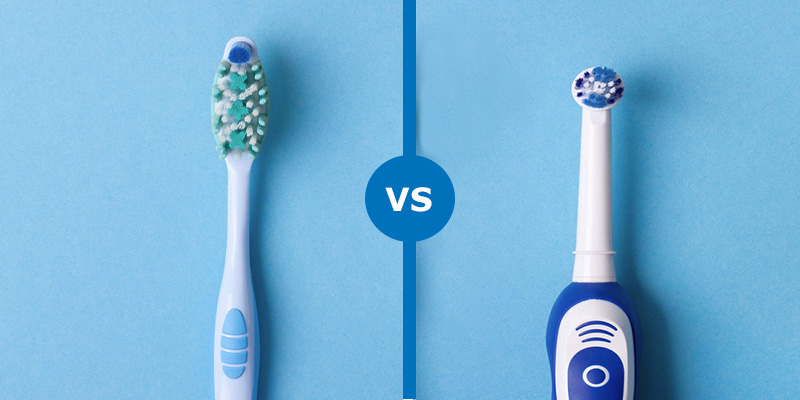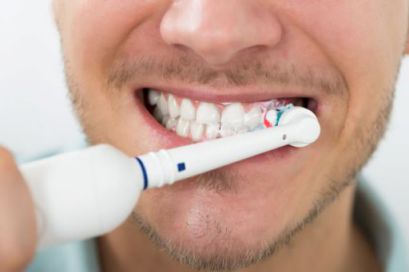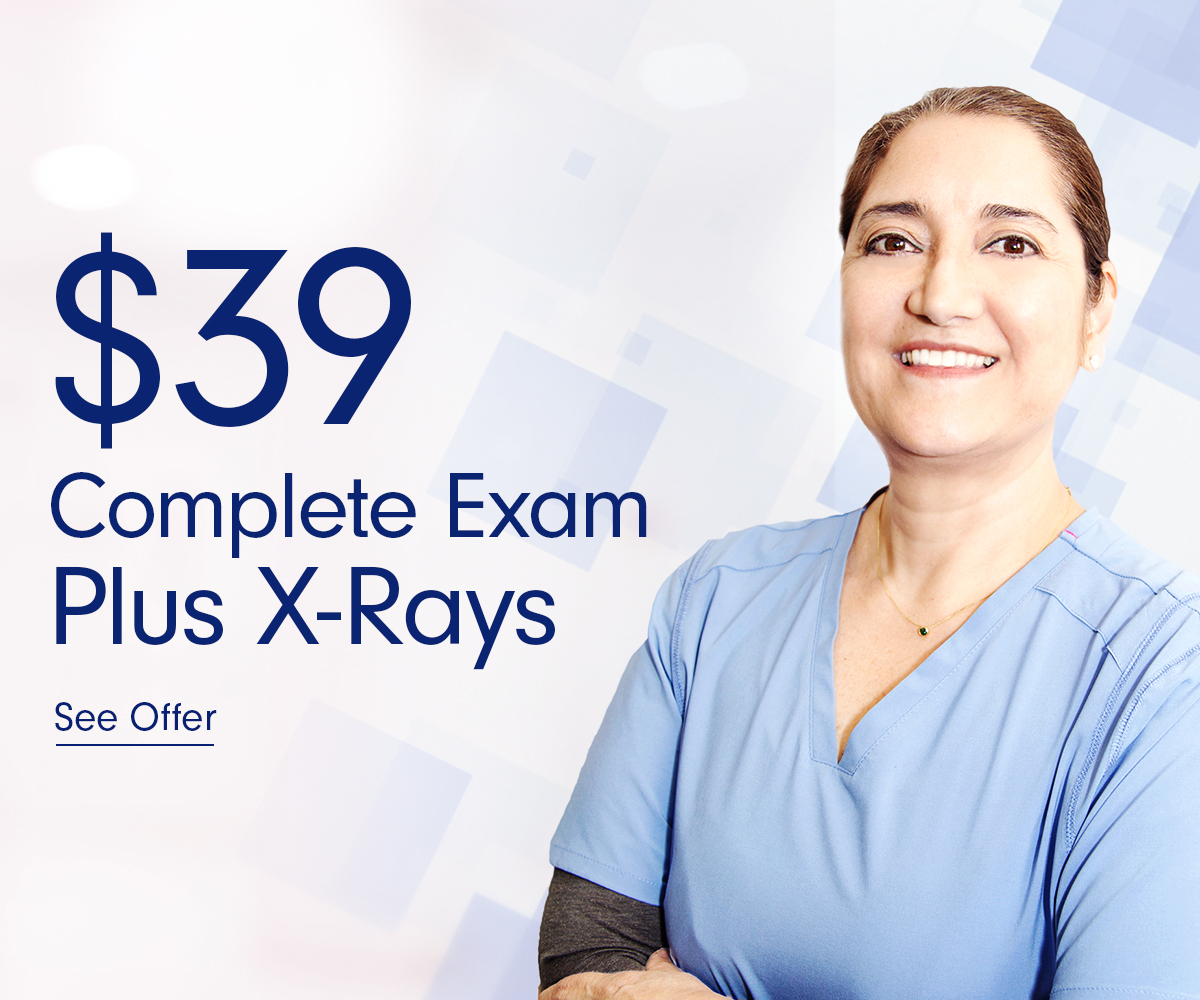Proper oral health starts with your daily hygiene habits at home. When you brush your teeth, you’re able to remove plaque, bacteria and odor-causing germs that can lead to problems with tooth decay and gingivitis. There are two different types of toothbrushes available on the market: manual and electric. Both options are effective, but some patients and professionals prefer one over the other. What works for one patient may not necessarily work for you, so it might be a good idea to try both to see which one you prefer.
Here are some pros and cons when it comes to manual and electric toothbrushes:
Effectiveness at Removing Plaque
The goal of any toothbrush is to remove plaque and bacteria from the mouth to prevent cavities, gum disease, and other dental issues. Let’s take a look at manual versus electric brushes when it comes to removing plaque.
Manual:
A manual toothbrush should be used at a 45-degree angle and slightly brush up against the gum line. When used this way, the manual brush works to effectively remove plaque and food particles from the teeth. One problem that comes with manual brushing is that it’s not strictly timed. This means that you need to be aware of how long you’re brushing to ensure that you’re cleaning your teeth for at least two minutes, twice a day. Manual toothbrushes also only work on a surface level, so they aren’t as effective at helping to push food and bacteria out from between the teeth.
Electric:
The electric toothbrush either uses a rotating head or sonic vibrations to break away plaque, food particles and debris from all surfaces of the teeth. Many electric toothbrushes have internal timers, which means they’ll beep and even shut off after two minutes so that you know you’ve brushed your teeth for the recommended amount of time. With an electric toothbrush, you simply guide the brush over your teeth while the brush does all of the work for you. It’s not uncommon for electric brushes to come with different modes, which makes it easier for those with sensitive teeth and gums to change the power being used.
Better for Orthodontic Patients
Whether you wear metal braces or clear aligners, it’s crucial that you keep your teeth clean by using a high-quality toothbrush. It is also just as important to floss between your teeth to dislodge bacteria and food particles.
Manual:
The manual toothbrush is ideal for orthodontic patients because it does not cause too many vibrations which could dislodge or break brackets and wiring. You also have more control over the manual brush, allowing you to brush more in certain areas where a lot of food tends to get stuck. However, one flaw with manual toothbrushes is that they may not be effective at getting to all areas of plaque and debris. This can cause cavities to form and require the need for subsequent dental fillings.
Electric:
Electric toothbrushes may be too harsh for orthodontic patients because the sonic vibrations or rotating head can break or loosen brackets and wiring. However, electric toothbrushes are also incredibly effective at removing plaque and food particles, even from between the teeth. These areas may be difficult to keep clean otherwise for orthodontic patients, so the electric toothbrush comes in handy for preventing cavities and other intra-oral problems. Using the electric brush on a sensitive or low setting can help to reduce pressure on the braces.
Price and Accessibility
While some patients are fine with spending more on a quality toothbrush, others aren’t in a position to layout hundreds for a high-end product. You may also want a toothbrush that’s convenient when traveling or one that’s easier to find when a replacement is needed.
Manual:
Manual toothbrushes can be found virtually anywhere and everywhere. This allows you to easily and quickly replace your brush every three months as recommended. Manual brushes are also much cheaper than electric options because there’s no fancy gadgetry or power cords involved. You may also find that a manual brush is much easier to bring with you when traveling since it can be stuffed into any toiletry or cosmetic bag along with a travel-sized toothpaste.
Electric:
Electric toothbrushes cost more money, even for models that aren’t as high-end or have as many features. Your electric toothbrush is going to rely either on a replaceable battery or a charger to keep it running efficiently. Because of this, you’ll need to bring the charger or extra batteries with you when you are traveling. Also, replacement brush heads may not be as easy to find and they can sometimes be just as expensive long-term. While electric toothbrushes are considered by many to be more effective at cleaning teeth, they probably aren’t the best choice for patients who want to save money on their dental hygiene needs.
Better for Kids
Children are notorious for neglecting their teeth if they can get away with it, which can lead to cavities and early extractions. Choosing the right brush can make all the difference in children’s dental health.
Manual:
Manual toothbrushes come in all different sizes, types, and varieties. Many of them even feature your child’s favorite superhero or cartoon character. This can make your child more interested in brushing. Children also have a habit of biting down into their toothbrushes, causing the need to replace the brush or brush head more often than is normally recommended. Since manual brushes are less expensive, it’s easier to replace them as needed. However, manual brushes need to be effectively used in order for them to completely remove plaque and debris. Children may not have the patience or ability to properly brush all of their teeth using a manual toothbrush if not monitored.
Electric:
Electric toothbrushes may be too powerful for small, sensitive teeth. However, there are many pediatric electric brushes that can easily be used by kids of all ages. The electric toothbrush will need to be charged regularly in order to effectively work at removing plaque and debris, so it may require parents to keep a more watchful eye on whether or not the brush is being charged. Your child may find it easier to keep their teeth clean using a power toothbrush and you may notice that they have better results at their bi-annual dental appointments as a result.
Importance of Routine Professional Dental Care
Regardless of which toothbrush you use, it is essential that you keep up with your bi-annual dental appointments. Even with the very best electric toothbrush as well as brushing and flossing twice a day, you still need a professional teeth cleaning that is done by a licensed hygienist. The hygienist not only works to remove hardened plaque and tartar from the teeth, but they will measure your gums to check for signs of gingivitis and gum disease. An exam can then be done to check for signs of decay and other dental problems.
Whether you choose to use a manual toothbrush or an electric one, it’s important to stick to a healthy oral care routine that works for you. You should be brushing your teeth at least twice a day for two minutes at a time. Flossing is just as important when it comes to removing debris, food particles and plaque from between the teeth. By brushing your teeth twice a day, flossing and keeping up with bi-annual dental appointments, you’ll find that you have a bright, beautiful and full smile.




